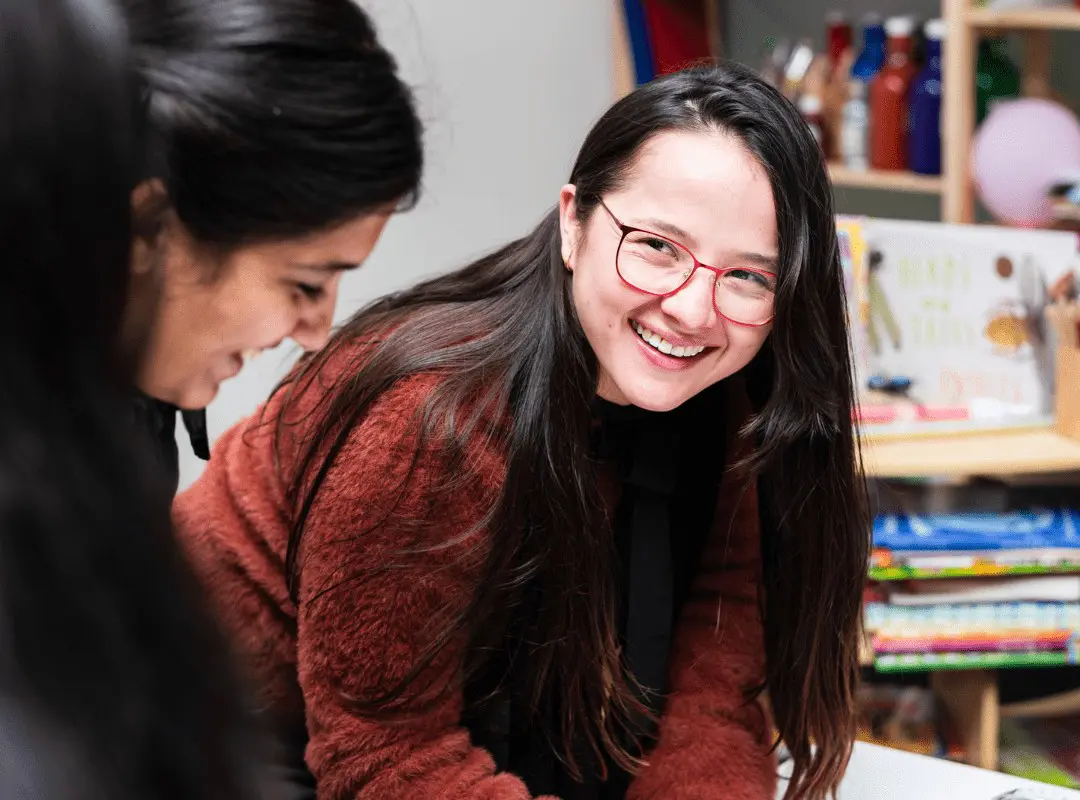Course Overview
Ikon’s Master of Teaching (Early Childhood) is your pathway to an exciting career as an early childhood teacher. You will develop specialised knowledge and professional skills to become an early childhood teacher for children from birth to five years.
You will discover how to use play pedagogy to teach subjects such as language, literacy, maths, numeracy, science, engineering, digital and design technologies, the creative arts, STEM and STEAM to young children. You will also learn contemporary early childhood contexts; documentation, planning and assessment; young children’s behaviour; working with families and communities; theories, pedagogies and curriculum; diverse and exceptional learners; practitioner inquiry research; leadership and service management.
With a strong foundation in educational theory and modern pedagogic approaches, you will be empowered to create curriculum and early childhood services that facilitate all children’s learning, development and wellbeing.
You will engage in 60 days of professional experience placements with babies, toddlers, and preschoolers in a variety of early childhood education settings. With Ikon, placements can be done at the service where you work so you can still earn while you learn.
This Masters qualification is FEE-HELP approved for eligible applicants, as well as Youth Allowance (student), Austudy and the Pensioner Education Supplement.
Professional Recognition
This course is recognised by the Australian Children’s Education and Care Quality Authority (ACECQA), qualifying graduates as early childhood teachers under the National Quality Framework.
Key Information
| Award | Master of Teaching (Early Childhood) |
| Duration | 2 Years Full Time (or 4 Years Part Time) |
| Study Mode | On-Campus Online |
| Locations | Adelaide Brisbane Melbourne Sydney Online |
| Intakes | February, May, September |
| Course Fees | Domestic (FEE-HELP available) International |
*International students may study up to one-third of the subjects in a course online. Domestic students may study the full course online.
Trimester 1, 2026 Applications Extended Due To Popular Demand
Career Opportunities
The Master of Teaching (Early Childhood) prepares graduates for a rewarding career as an early childhood teacher. You will have the skills and knowledge to educate and care for children aged birth to five years in various settings such as preschools, childcare centres, occasional care and educational centres.

Course Structure
The Master of Teaching (Early Childhood) comprises 16 equally weighted subjects of 6 credit points each (total of 96 credit points) delivered over six trimesters.
A typical full-time study load is 3 subjects per trimester, including completion of work placement in year 2.
Each trimester consists of twelve weeks of teaching.
Delivery & Workload
Course delivery for the Master of Teaching (Early Childhood) is a combination of lectures, tutorials, student forums and independent study.
You should allow a notional 10-12 hours per week for each subject studied.
Subjects
Year 1
Year 2
This subject examines the guiding principles, ethical considerations, regulatory considerations, and the National Quality Framework (NQF) that inform and guide early childhood teacher’s professional identity and practice. Students will gain valuable insights into:
- UN Declarations and Conventions
- Duty of care obligations and Australian Early Childhood Code of Ethics
- Approved Early Years Learning Framework (Vision, Principles, Practices, Learning Outcomes)
- Australian Professional Teaching Standards
- Regulatory considerations in early childhood settings (Laws, regulations, WHS and Child Protection)
- Children’s safety, health, nutrition, wellness and wellbeing in early childhood contexts.
Subject Code: EPRO501
Credit Points: 6
This subject provides students with the in-depth knowledge and skills necessary to become an effective early childhood teacher through engagement in play, teaching and the planning cycle. Students will gain valuable insights into:
- Play in the early years
- Early childhood pedagogy
- Teaching strategies in the early years
- Stages of the EYLF Planning cycle
- Observation, assessment and evaluation in the early years.
- Planning and implementing playful learning environments and experiences for infants, toddlers and preschoolers
Subject Code: ETCH502
Credit Points: 6
This subject explores and synthesises the interconnected dimensions of young children’s development, learning and wellbeing. Students will gain valuable insights into:
- Dimensions and child development in the early years
- Young children’s embodied agency
- Theoretical perspectives and the influences of nature and nurture in shaping young children’s development
- Brain development and neuroscience
- The reciprocal relationship between the physical, cognitive, language and communication, social, emotional, spiritual, creative and exceptionality dimensions and how these collectively shape children’s developmental trajectories, experiences and growth.
Subject Code: EDEV552
Credit Points: 6
his subject explores and synthesises the relationship between creativity and curriculum in early childhood educational settings. Students will gain valuable insights into:
- Creativity in the early years
- Play, development, thinking and creativity
- Teaching creativity
- Facilitation creativity across visual arts, media arts, drama, dramatic play, puppetry, music, movement, dance, language and literacy, science, engineering, technologies, mathematics and numeracy, humanities, social science, STEM, STEAM, STREAM and STEMIE.
Subject Code: ETCH503
Credit Points: 6
his subject investigates the multifaceted nature of relationships between early childhood educators, children, families, and communities, with a particular focus on how these interactions impact young children’s development and wellbeing. Students will gain valuable insights into:
- Australian family and community sociology
- Family structures
- Young children in their contexts
- Contemporary child contexts (cultural diversity, identity, gender, mental health and wellbeing, developmental disabilities and advanced development)
- Contemporary family contexts (economic, cultural diversity, social, health and wellbeing)
- Contemporary community contexts (climate change, natural disasters, sustainable world, pandemics, digital world)
- Contemporary influences on children within their family and community contexts (Australian First Nations, immigration, health, trauma, family violence)
- Child protection requirements
- Government initiatives
Subject Code: EPRO506
Credit Points: 6
his subject develops proficiency in recognising, applying and critically assessing the theoretical, curriculum and pedagogic influences that underpin contemporary Australian early childhood teaching and professional practice. Students will gain valuable insights into:
- Theoretical perspectives, theory, theories and theorists
- Curriculum and pedagogy of the Early Years Learning Framework
- Curriculum ideologies and models
- Curriculum approaches, pedagogies and young children’s learning
- Developmental, socio-cultural, socio-behaviourist, humanist, critical, constructivist, post-structuralist, post-modernist, cultural-historical, activity, CHAT, Bioecological, Theory of Mind, Theory of Biology, Theory of Physics, and Executive Functions theoretical perspectives, pedagogy and learning
- Making theory visible in early childhood practice
- Australian National Professional Standards for Teachers
Subject Code: EPRO508
Credit Points: 6
his subject explores the multifaceted aspects of young children’s behaviour to understand how to support and guide their development within the learning environment. Students will gain valuable insights into:
- Principles of early childhood education and behaviour
- Educational and behavioural goals of early childhood programs
- Principles and strategies of behaviour guidance
- Theoretical perspectives
- The brain, development, influences and behaviour
- Needs, emotions, self-regulation, emotional and social difficulties, atypical development and their influence on behaviour
- Influence on behaviour
- Attachment and listening to children
- Designing and providing child-centred curriculum
- Persistent challenging behaviours
- Collaborating with families
Subject Code: ETCH507
Credit Points: 6
This subject explores the multifaceted concept of exceptionality, inclusion, and behaviour guidance within the context of early childhood education in Australia. Students will gain valuable insights into:
- Contemporary perspectives on inclusion, exceptionality and inclusive practices
- Declarations, legislation and policy in early years inclusion
- Inclusive early childhood settings and team approaches
- Supporting young children experiencing diagnosed disability, sensory processing, modulation, disorders, mental health and chronic health conditions, effects of trauma, or behaviours that challenge.
- Promoting young children’s belonging, attachment, co-regulation and self-regulation, emotions and emotional intelligence
- Designing inclusive curriculum through literacy, numeracy, creative arts, science, technology and engineering, and STEM
Subject Code: EPRO509
Credit Points: 6
This subject explores the multifaceted aspects of language, and literacy development in early childhood, emphasising their fundamental significance in shaping young children’s overall development, learning, play, and inquiry-based experiences. Students will gain valuable insights into:
- The importance of early language, literacy, multiliteracies and multimodality learning
- Theoretical perspectives of language emergence
- Language and literacy development of infants, toddlers and preschoolers
- Play, language and literacy
- Language diversity and differences
- Oral language development and interacting with others
- Engaging with texts
- Language of self-expression
- Symbols and patterns
- Emergent writing and reading
- Environments and curriculum provision
Subject Code: ETCH510
Credit Points: 6
This subject examines the processes involved in the development of mathematics and numeracy skills during early childhood, focusing on birth to 5 years. Students will gain valuable insights into:
- Mathematics and numeracy education
- Theoretical perspectives of mathematics and numeracy
- Mathematics and numeracy development of infants, toddlers and preschoolers
- Play, mathematics and numeracy
- Mathematics and numeracy diversity and differences
- Mathematical concepts and skills (Patterns, space and geometry, measurement, number and algebra, data, statistics, probability)
- Teaching pedagogies and strategies for mathematic and numeracy learning
- Environments and curriculum provision
Subject Code: ETCH511
Credit Points: 6
This subject explores the opportunities and challenges in teaching and promoting the foundations of science, engineering, design and digital technologies within the context of early childhood education. Students will gain valuable insights into:
- Science, engineering and technologies curriculum provision in the early years
- Engineering processing and thinking skills: critical, creative, curious and persistent thinkers, flexible, reflective and collaborative thinkers
- Science: Earth, space, biological, chemical and physical
- Design technology in early childhood
- Digital technologies and digital citizenship
- Computational thinking and digital play
- Children as consumers and creators of knowledge across the curriculum
Subject Code: ETCH512
Credit Points: 6
This subject aims to develop students’ in-depth knowledge, skills and understanding of teaching young children through visual art, media art, music, movement, dance, and drama. Students will gain valuable insights into:
- Creative arts in early childhood contexts
- Pedagogical principles and practices
- Learning in visual arts, media arts and music
- Teaching through visual arts, media arts, music, movement, dance and drama
- Creative arts integrated across the curriculum
Subject Code: ETCH513
Credit Points: 6
This subject enables students to synthesise and consolidate prior learning of the early childhood professional and early years contexts over a total of 40 days supervised professional experience with young children birth to 5 years. Students will complete 20 days of professional experience with infants birth to 24-months and 20 days of professional experience with young children aged 2 to 5 years. Students will gain valuable insights into:
- Infant, toddler and preschooler education
- Infant, toddler and preschooler personal care routines, health and safety provision
- Teaching infant, toddler and preschooler education
- Application of the Planning Cycle
- Transition to school
- Enhancing teaching through critical reflection
Subject Code: PLAC955
Credit Points: 6
Pre-Requisites: EPRO501, EDEV552, ETCH502, ETCH503, EPRO506, ETCH507, EPRO508, EPRO509, ETCH510, ETCH511
Co-Requisites: ETCH512 or ETCH513
This subject provides students with the essential knowledge and skills needed to engage in practitioner-inquiry-research within early childhood education and care contexts. Students will gain valuable insights into:
- Research in early childhood education
- Educational leadership, inquiry and research
- Designing research
- Literature reviews and analysing data
- Proposals, ethics, tools, approaches and data collection
- Reports and presentations
Subject Code: EPIR514
Credit Points: 6
Pre-Requisites: EPRO508, ETCH10, ETCH11, ETCH12, ETCH13
This subject provides students with a comprehensive foundation in leadership and service management within early childhood contexts. Students will gain valuable insights into:
- Defining leadership, theories, models and styles, qualities, skills and dispositions
- Educational leadership, educational leaders, roles and responsibilities
- Defining management, roles, responsibilities, practices, principles, skills and knowledge
- Management structures and types of services
- Quality service provision
- Leading and managing compliance, financial obligations, marketing and promotions, workplace health and safety, recruitment and performance, team effectiveness and professional development, change, relationships and engagement
Subject Code: ELDR515
Credit Points: 6
Co-Requisites: EPIR514, ELDR515
This subject enables students to demonstrate personal agency and leadership identity by choosing the age group and early childhood service type for their final 20 days of supervised professional experience. This placement provides students with the opportunity to apply specialised knowledge and skills in teaching; child development, learning and wellbeing; educational and curriculum leadership; practitioner inquiry; leadership and service management. Throughout this placement, students will engage with:
- The National Quality Standards
- The Principles and Practices of the Early Years Learning Framework
- The AITSL Graduate Teacher Standards
- Contemporary teaching and curriculum practice
- Critical reflective practices
Subject Code: PLAC956
Credit Points: 6
Pre-Requisites: PLAC955
Co-Requisites: EPIR514, ELDR515

Recognition of Prior Learning (RPL)
At Ikon, your past studies or work experience can be acknowledged through Recognition of Prior Learning (RPL) or Credit Transfer.
RPL evaluates your previous skills and experience against the learning outcomes of Ikon subjects, potentially exempting you from studying certain subjects. Credit Transfer allows your previous studies to contribute towards your qualification, granting credits based on matched content and learning outcomes between equivalent qualifications. These pathways could help you to fast track your qualification, reducing study time and tuition fees.
Entry Requirements
Domestic Students
International Students
Academic Admissions Criteria
Applicants must have:
- A recognised Bachelor degree in any field; or
- A recognised Graduate Diploma of early childhood teaching; or
- An Australian or ACECQA approved equivalent Diploma in Early Childhood Education and Care with professional experience equivalent to three (3) years full-time (within the past 7 years).
Non-Academic Admissions Criteria
All applicants must submit a Teacher Education Teaching Statement demonstrating suitability to become an effective early childhood teacher.
Inherent Requirements
Applicants must demonstrate they can meet the ten domains of inherent requirements needed to successfully complete the course including: ethical behaviour, behavioural stability, legal, communication, cognition, relational skills, reflective skills, sensory abilities, strength and mobility and sustainable performance. To demonstrate this, applicants will need to complete an online questionnaire as part of the application process.
Placement Requirements
Below are additional course requirements students must meet prior to undertaking placement.
Working with children check
Students will be required to hold a valid Working with Children (WWC) Check prior to undertaking professional placement as part of this course.
Immunisations
All students enrolled in an Early Childhood Teacher Program are required to provide validation of immunisation (Influenza, Whooping Cough, MMR, and COVID) for placement in early childhood settings.
Academic Admissions Criteria
Applicants must have:
- A recognised Bachelor degree in any field; or
- A recognised Graduate Diploma of early childhood teaching; or
- An Australian or ACECQA approved equivalent Diploma in Early Childhood Education and Care with professional experience equivalent to three (3) years full-time (within the past 7 years).
Non-Academic Admissions Criteria
All applicants must submit a Teacher Education Teaching Statement demonstrating suitability to become an effective early childhood teacher.
Inherent Requirements
Applicants must demonstrate they can meet the ten domains of inherent requirements needed to successfully complete the course including: ethical behaviour, behavioural stability, legal, communication, cognition, relational skills, reflective skills, sensory abilities, strength and mobility and sustainable performance. To demonstrate this, applicants will need to complete an online questionnaire as part of the application process.
English Language Proficiency
6.5 overall with speaking no less than 6.5; listening, writing and reading no less than 6.0.
Placement Requirements
Below are additional requirements students must meet prior to undertaking placement.
Working with children check
Students will be required to hold a valid Working with Children (WWC) Check prior to undertaking professional placement as part of this course.
Immunisations
All students enrolled in an Early Childhood Teacher Program are required to provide validation of immunisation (Influenza, Whooping Cough, MMR, and COVID) for placement in early childhood settings.
Find Out More!
Complete the form below to download our course brochure and find out more about the Master of Teaching (Early Childhood).

